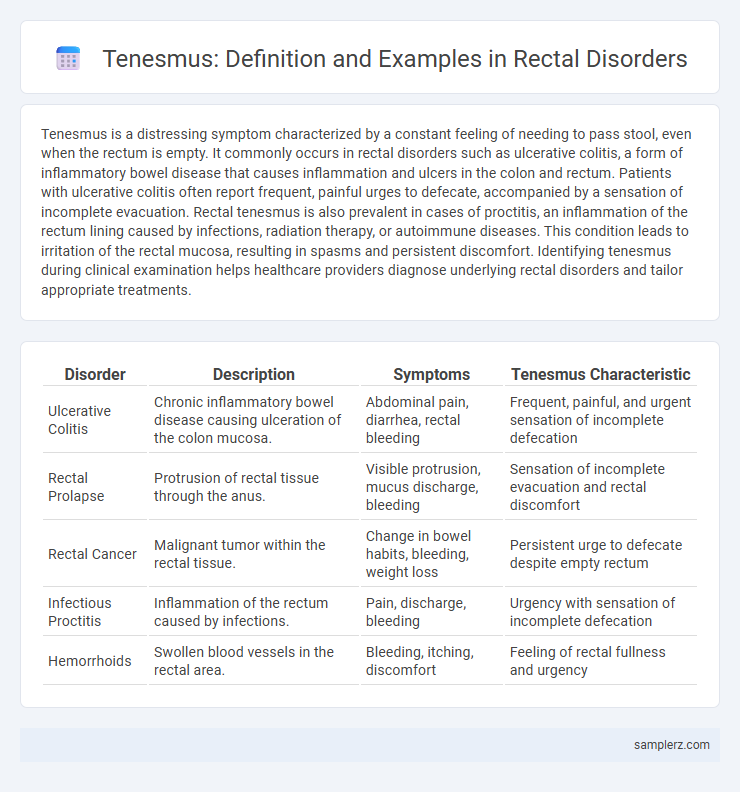Tenesmus is a distressing symptom characterized by a constant feeling of needing to pass stool, even when the rectum is empty. It commonly occurs in rectal disorders such as ulcerative colitis, a form of inflammatory bowel disease that causes inflammation and ulcers in the colon and rectum. Patients with ulcerative colitis often report frequent, painful urges to defecate, accompanied by a sensation of incomplete evacuation. Rectal tenesmus is also prevalent in cases of proctitis, an inflammation of the rectum lining caused by infections, radiation therapy, or autoimmune diseases. This condition leads to irritation of the rectal mucosa, resulting in spasms and persistent discomfort. Identifying tenesmus during clinical examination helps healthcare providers diagnose underlying rectal disorders and tailor appropriate treatments.
Table of Comparison
| Disorder | Description | Symptoms | Tenesmus Characteristic |
|---|---|---|---|
| Ulcerative Colitis | Chronic inflammatory bowel disease causing ulceration of the colon mucosa. | Abdominal pain, diarrhea, rectal bleeding | Frequent, painful, and urgent sensation of incomplete defecation |
| Rectal Prolapse | Protrusion of rectal tissue through the anus. | Visible protrusion, mucus discharge, bleeding | Sensation of incomplete evacuation and rectal discomfort |
| Rectal Cancer | Malignant tumor within the rectal tissue. | Change in bowel habits, bleeding, weight loss | Persistent urge to defecate despite empty rectum |
| Infectious Proctitis | Inflammation of the rectum caused by infections. | Pain, discharge, bleeding | Urgency with sensation of incomplete defecation |
| Hemorrhoids | Swollen blood vessels in the rectal area. | Bleeding, itching, discomfort | Feeling of rectal fullness and urgency |
Understanding Tenesmus: Definition and Symptoms
Tenesmus is a distressing symptom characterized by a persistent sensation of incomplete evacuation despite an empty rectum, commonly associated with rectal disorders such as proctitis, inflammatory bowel disease, or colorectal cancer. Patients often report cramping rectal pain, frequent urges to defecate, and straining without productive bowel movements, indicating mucosal inflammation or irritation. Recognizing these clinical features helps distinguish tenesmus from other defecatory abnormalities and guides appropriate diagnostic evaluation.
How Tenesmus Manifests in Rectal Disorders
Tenesmus in rectal disorders manifests as a persistent, painful urge to defecate despite an empty rectum, often accompanied by straining and cramping. Common conditions causing rectal tenesmus include inflammatory bowel diseases such as ulcerative colitis and Crohn's disease, as well as rectal cancer and proctitis. This symptom typically reflects underlying inflammation, irritation, or obstruction within the rectal mucosa or distal colon.
Common Rectal Disorders Associated with Tenesmus
Tenesmus frequently occurs in rectal disorders such as proctitis, colorectal cancer, and inflammatory bowel disease (IBD), causing a persistent sensation of incomplete evacuation. Ulcerative colitis and Crohn's disease often present with tenesmus due to inflammation and ulceration in the rectal mucosa. Diagnosing tenesmus involves identifying underlying causes like rectal strictures, infections, or neoplasms that contribute to chronic rectal discomfort and urgency.
Inflammatory Bowel Disease and Tenesmus
Tenesmus in rectal disorders commonly manifests in patients with Inflammatory Bowel Disease (IBD), particularly in ulcerative colitis and Crohn's disease. This distressing symptom presents as a persistent sensation of incomplete evacuation despite an empty rectum, often accompanied by pain and urgency. Effective management of tenesmus in IBD requires targeted anti-inflammatory therapies to reduce mucosal irritation and rectal spasms.
Tenesmus in Colorectal Cancer: Warning Signs
Tenesmus in colorectal cancer presents as a persistent sensation of incomplete bowel evacuation, often accompanied by rectal pain and straining. This symptom indicates potential tumor growth near the rectum, causing irritation and obstruction in the colorectal region. Recognizing tenesmus early is crucial for prompt colorectal cancer diagnosis and improved patient outcomes.
Infectious Causes of Rectal Tenesmus
Rectal tenesmus often occurs in infectious disorders such as amoebic dysentery, shigellosis, and sexually transmitted infections like gonorrhea and chlamydia, which cause inflammation and irritation of rectal mucosa. Bacterial infections, including Salmonella and Campylobacter, can also trigger tenesmus through mucosal ulceration and proctitis. Persistent tenesmus in these infections signals ongoing mucosal damage and requires targeted antimicrobial therapy to resolve the underlying infectious process.
Tenesmus and Proctitis: Clinical Presentation
Tenesmus is a distressing symptom characterized by a persistent sensation of incomplete evacuation, commonly observed in patients with proctitis, an inflammation of the rectal mucosa. Clinical presentation includes frequent, painful urges to defecate, often accompanied by rectal pain, mucous discharge, and occasional bleeding. Accurate identification of tenesmus and its association with proctitis aids in diagnosing underlying conditions such as inflammatory bowel disease or infectious colitis.
Functional Bowel Disorders and Tenesmus
Tenesmus in rectum disorder is commonly observed in functional bowel disorders like irritable bowel syndrome (IBS) and functional constipation, where patients experience a persistent sensation of incomplete evacuation despite bowel movements. This distressing symptom often results from abnormal rectal motility and heightened visceral sensitivity, contributing to chronic discomfort and urgency. Effective management typically involves a combination of dietary changes, pharmacotherapy targeting gut motility, and behavioral interventions to alleviate symptoms and improve quality of life.
Diagnostic Approach for Rectal Tenesmus
Rectal tenesmus, often associated with inflammatory bowel disease, rectal tumors, or infections, requires a comprehensive diagnostic approach involving digital rectal examination, proctoscopy, and imaging studies such as pelvic MRI or endorectal ultrasound. Stool analysis and biopsy are essential for identifying underlying causes like ulcerative colitis or rectal carcinoma. Combining clinical evaluation with targeted diagnostic tests ensures accurate differentiation between functional disorders and organic pathology responsible for rectal tenesmus.
Managing Tenesmus in Rectal Disorders: Treatment Strategies
Managing tenesmus in rectal disorders involves targeted treatments such as anti-inflammatory medications, stool softeners, and pelvic floor physical therapy to alleviate rectal spasms and discomfort. In cases of inflammatory bowel disease or rectal prolapse, corticosteroids and immunosuppressants can reduce inflammation and frequency of tenesmus episodes. Surgical intervention may be necessary for severe structural abnormalities causing persistent tenesmus unresponsive to conservative management.

example of tenesmus in rectum disorder Infographic
 samplerz.com
samplerz.com